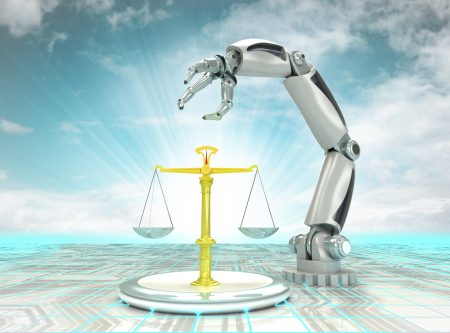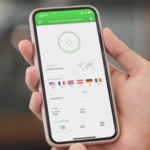May 2, 2017 – Please welcome Matthew L. Willens as guest blogger for today’s posting. Matthew is a Chicago trial lawyer. He is an Adjunct Professor at Loyola University’s Chicago School of Law. When he isn’t practicing the law or teaching, he can be found spending time with family or busting out his guitar for a hard rockin’ jam session. He even has quoted himself in the article which I hope you find to be both intriguing, and if you are lawyer, a good resource for understanding the implications of artificial intelligence on the present and future practice of law. Enjoy the read and feel free to comment.
Imagine an application that reduces 10 hours’ worth of legal work into a mere instant. That is the kind of change that is occurring in the legal industry thanks to industry-specific technologies, particularly artificial intelligence (AI).
AI is no longer just the next big thing in the practice of law – it is now a powerful force reshaping the lives of lawyers worldwide. Further, experts say that it will continue to change the industry well into the future, so attorneys and law firms must be prepared to adapt.
Lawyer Tests AI Research Program Against Himself
Luis Salazar is a partner in a Miami bankruptcy law firm. Last November, he began using the research engine from Ross Intelligence, which leverages IBM’s Watson AI technology and applies it to automate legal research. At a user’s request, the Ross program reads through thousands of cases, citations, and full legal briefs, sifting through them to deliver a ranked list of the most relevant ones.
Salazar tested the program against himself. He took 10 hours searching through online databases to find one case that almost mirrored the one he was then working on. The Ross system, meanwhile, found it almost instantly.
A similar efficiency gain is brought on by an AI application from Kira Systems. The software is designed to automate the review of legal contracts, sharply sorting the documents before lawyers read them. Already, clients of Kira are attesting that this automation saves them as much as 60 percent of time spent on contract review.
Examples of AI in the Legal Industry
Such dramatic increases in efficiency have started making ripples in the legal market. The New York Times reported that as AI automates a huge chunk of legal tasks, especially low-level ones, corporate clients are now less willing to pay for junior professionals to do the routine work. Instead, they want their money to go into in-depth analysis, strategy, and other high-level tasks that lawyers must focus on.
There are numerous other examples of AI currently being harnessed in the legal field. To name some:
- Time tracking and billing. Software products such as Intapp Time, Legal Tracker (formerly Serengeti Law), TeamConnect, and Tymetrix 360 streamlines the process of tracking billable hours.
- Analytics. Legal professionals can make data-based predictions of judges, other law firms and lawyers, parties, and patents with the assistance of AI tools such as Lex Machina and Ravel Law.
- Contract review. The Kira program mentioned above is only one of the many contract review AI systems that use natural language processing tools and “learns” from new documents to refine contract review. Other popular products include LawGeex and eBrevia.
- E-Discovery. Electronic discovery hastens and improves the traditional discovery process by sharply segregating relevant documents. AI in this field uses predictive coding, which means it watches human search behavior and uses what it learns to identify what is relevant. Highly rated e-discovery solutions include Safelink Litigation and IPRO Eclipse.
The Future Of Legal AI
So where does AI technology bring the legal industry in the future?“The honest answer is we don’t know,” says Ben Allgrove, a partner at the 4,600-lawyer firm Baker McKenzie, which is one of the major firms now undertaking initiatives to exploit emerging tech. The firm has recently set up a committee to track technology and develop appropriate strategy.
It is indeed difficult to determine how exactly technology is going to reshape any industry, especially the risk-averse, slow-to- change legal industry. The New York Times pointed out that years ago, professionals like lawyers assumed they would be exempted from the pace of technology improvement, because theirs was a profession heavily wrapped in language. But as it is evident today, AI has unlocked even language-heavy tasks such as document segregation.
Could AI Eventually Replace Human Lawyers?
The profound changes occurring today have led some to hypothesize that AI might eventually replace human professionals. Thankfully, experts agree that this is not likely anytime soon.
Asked if AI is going to terminate jobs for lawyers or create new ones, the likely answer is both, posits Janet Fuhrer, President of the Canadian Bar Association. Even if the drudge work is completely taken over by technology, she says “there are still lots of opportunities for lawyers, even with technology, to provide services.”
A report released last year by Deloitte Insight projects that a whopping 39% of jobs in the legal sector could be automated in the longer term due to radical changes in tech.
One example of such a profound change rising in the near future is the refining of the jury analysis and selection process using AI. Earlier this month, tech firm Voltaire launched an application that does just that. The software crunches big data on potential jurors, including their social media posts, to create a detailed profile of them and analyze whether they would be fit to sit at the trial.
What do trial lawyers think of using AI in the jury selection process?
“Jury selection, or as I call it, jury de-selection, is one of the most important parts of a trial. Yet, it’s not taught in law school, (at least not when I went), it’s not something that a young lawyer is necessarily trained to do and many lawyers go through entire careers as a trial lawyer without knowing much about jury de-selection. Using AI, even if it is only somewhat accurate, can be a tremendous addition to a trial lawyer’s arsenal,” says veteran trial lawyer Matthew Willens of Willens Law Offices out of Chicago.
Traditionally, this whole process entails painstaking and expensive manual methods, but the program completes it in a matter of moments. The elimination of manual work is a primary reason some legal professionals are concerned about the impact on their roles.
Legal Industry Very Optimistic about AI
But despite this, the industry is very optimistic that AI – and technology at large – will serve to assist human work instead of replacing it.
James Yoon, for instance, stands proof of this. A partner at the California firm Wilson Sonsini Goodrich & Rosati, he says that the work that consumes most of his time – and the work that clients are willing to pay for – are not the ones that AI automates, but human work such as creativity, empathy, judgment, and strategy.
Sofia Lingos, board member of the Legal Technology Resource Center of the American Bar Association, agrees. On artificial intelligence, she has this to say: “It is wise to embrace it now so that it can be a tool as opposed to an impediment.”
















[…] nytimes, Can Robots be lawyers?, 21stcentech, abajournal, lawinorder, […]
[…] https://www.21stcentech.com/artificial-intelligence-change-practice-law/ […]